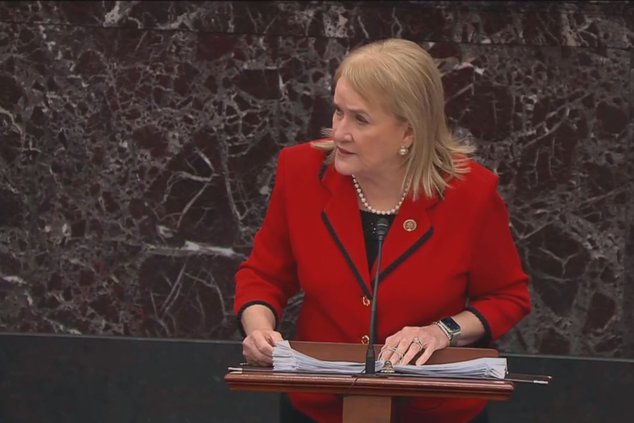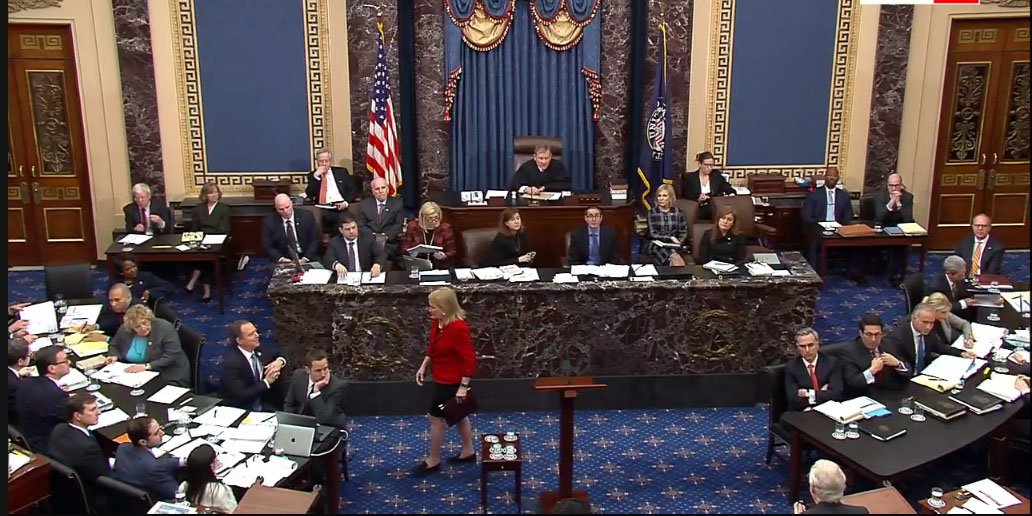Editor's note: This is the first in a series of reports following the Senate impeachment hearings.
As the third-ever presidential impeachment trial got underway this week in the U.S. Senate, Americans were watching. The Great Bend Tribune tuned in to observe how justice would play out, and to monitor votes of U.S. Sen. Pat Roberts and U.S. Sen. Jerry Moran.
Both have indicated in prior statements to the press that they each do not support the articles of impeachment, but as potential jurors, they felt it inappropriate to comment on impeachment.
Moran serves on a number of Senate committees including Appropriations; Banking; Commerce; Science and Transportation; Indian Affairs, and Chair of the Veteran’s Affairs Committee.
Roberts serves on the following U.S. Senate committees: Agriculture, Nutrition and Forestry; Finance; Rules and Administration; Health, Education Labor and Pensions and the Select Committee on Ethics.
Day One
Day one, members of the Senate took a solemn oath that they would hold a fair trial and uphold justice, signing the book of impeachment.
Then, rules were set forth for how the impeachment trial would be conducted. While at the outset the Senate stated it preferred to model the trial after the rules set down by the President Bill Clinton impeachment trial, critical changes were pushed through by the Republicans over the objections of Democrats.
This was not the case for the Clinton trial. Then, the rules were agreed upon unanimously by both parties as a result of negotiations.
As presented on the first day, the trial would allow both sides 24 hours for opening arguments over a two day period, would allow the Senate to vote on the inclusion of evidence in the record of the House impeachment proceedings, and would delay consideration for the inclusion of documents and evidence and the testimony of witnesses until after the opening arguments and questions have been made.
This process, it was argued by House and Senate Democrats, would not allow a fair trial. According to Rep. Adam Schiff, (D-CA), a House Impeachment Manager, all 90,000 documents were provided before the Clinton trial. The McConnell rules do not guarantee that the American people will ever see those documents, he said, calling it “a profound departure from the Clinton rules.”
White House lawyer Pat Cippolini, argued that the House failed to request documents or testimony prior to the trial, relying instead on the Senate to “do their job for them.” He laid fault for the exclusion of the documents and testimony at the feet of the House Impeachment Managers.
Day Two
Early in day two, and at the behest of a few Republicans, the time for opening arguments was extended to three days, and it was agreed the House record could be entered as evidence, however, the president’s defense team could raise an objection to the admission of particular evidence. This will trigger a Senate vote.
For the Clinton trial, not only was the evidence entered at the start of the trial, the president’s defense team was not allowed to object to it later.
Once McConnell’s changes were adopted, the next 13 hours were spent proposing and tabling amendments to the rules set down by the Senate concerning what evidence and witnesses would be allowed. The first eight hours, three amendments were presented and argued. A 30-minute dinner break was taken around 8 p.m., and arguments lasted into the night. The remaining eight amendments were argued, and language between the two sides became increasingly ugly until finally Supreme Court Chief Justice John Roberts had to remind both sides to conduct themselves with civility.
U.S. Senate Minority Leader Chuck Schumer introduced 11 amendments to the rules.
“We feel this is an obligation we have to the Constitution, to outline what a fair trial would be, to not go along with a cover-up, with a sham trial. And we will do it. We will do it. Right off the bat, Republican senators will face a choice about getting the facts or joining Leader McConnell and President Trump in trying to cover them up. This is a historic moment. The eyes of America are watching. Republican senators must rise to the occasion,” he said.
U.S. Senate Majority Leader Mitch McConnell signaled prior to the proposal of the first proposed amendment he would make a motion to table each and every amendment after their presentation.
11 Amendments proposed by Schumer on Day 2:
• Subpoena witnesses and documents from the White House.
• Subpoena documents from the State Department related to calls between President Trump and Ukrainian President Zelensky.
• Subpoena Office of Management and Budget records
• Compel testimony from acting White House chief of staff Mick Mulvaney
• Subpoena Department of Defense documents
• Subpoena testimony from Mick Mulvaney adviser Robert Blair and OMB official Michael Duffey
• To “prevent the selective admission of evidence and to provide for appropriate handling of classified and confidential materials,”
• Subpoena former National Security Advisor John Bolton to testify in the impeachment trial
• Guarantee that any motion to subpoena additional witnesses or documents would get a vote.
• Allow 24 hours for both sides to respond to any motions that might be filed Wednesday.
• A requirement that Roberts rule on motions to subpoena witnesses and documents.
The amendments were presented and argued for by House impeachment managers, while Cippolini rebutted for the White House. True to his word, McConnell made his motions, triggering Senate roll call votes each time. Action to table or kill all 11 of the proposed amendment was decided on party lines. Moran and Roberts were among the 53 Republicans that voted in favor of the motions, with 47 Democrats voting against.
Only one Republican, Susan Collins of Maine, aligned with Democrats for the motion to table the 10th proposed amendment, asking to allow impeachment managers a day, rather than two hours, to respond to White House pretrial motions.
Day Three
The House impeachment management team took the floor to introduce opening arguments following the prayer by the Senate chaplain at 1 p.m. ET on Wednesday.
“Help them remember that patriots reside on both sides of the aisle, that words have consequences and that how something is said can be as important as what is said. Give them a civility built upon integrity that brings consistency in their beliefs and actions. We pray in your powerful name, amen.”
Schiff laid out the two articles of impeachment, as well as a brief recap of the timeline of Trump’s alleged abuses of power beginning with withholding aid to Ukraine, and then coercing Zelensky to announce an investigation into both Joe and Hunter Biden, as well as a request to investigate the president’s theory that Ukraine, rather than Russia, was behind the interference into the 2016 presidential election.
Schiff stated the theory had not basis, and had already been debunked by the U.S. intelligence community.
Schiff promised the Senate would see documentary evidence the president was unable to conceal. He also added they will see new documents that remain in the possession of the president, as well as new testimony from a variety of witnesses if the Senate will allow it, in the name of a fair trial.
Then, House impeachment managers began laying out a chronological timeline of events, including numerous iterations of the assertion that the favor Trump requested of Zelensky, to announce an investigation of Joe Biden, as well as his efforts to hold back aid already approved by the Congress for at least five months until Zelensky agreed to the favor, had dire consequences for the Ukraine in its ongoing war and negotiations with Russia.
There was a vocal protest from the public gallery during comments by Hakeem Jeffries, (D-NY), a House Impeachment Manager. The protester was removed, and Jeffries continued without any apparent reaction. Following his comments, the Senate recessed for a 30-minute break for dinner, returning shortly after 7 p.m. ET.
At the end of the day, Schiff summarized the complete timeline: Joe Biden’s announcement he would run for the Democratic nomination for the 2020 presidential election, the recall and smear campaign of U.S. Ambassador to Ukraine, congratulatory phone call to Volodymyr Zelensky upon his election as president of Ukraine, Congress’ approval of $391 million in aid to Ukraine in its war against Russia, Trump’s decision to hold back the aid, his phone call to Zelensky where he asked for the favor, subsequent efforts by Trump’s personal attorney Rudy Giulliani to pressure Zelensky to follow through on the favors throughout the summer and into September, the coming forward of whistle-blowers concerned about the order to hold back aid, Trump’s release of the aid to Ukraine, and numerous additional witnesses stepping forward, requests for documents and testimony from various persons, and the White House’s efforts to block their receipt through refusals and threatened lawsuits.
Day Four
Laying out the Constitutional basis for the two articles of impeachment were the focus of the opening comments offered by the House Impeachment Managers Thursday.
Jerry Nadler, D-NY, laid out definitions for high crimes and misdemeanors, providing historical references going back to the framers of the Constitution, and continuing through the 19th and 20th centuries.
Impeachment is not for petty offenses. It is not for mere mistakes, he said. High crimes and misdemeanors involve wrong doing that reveals the president is an ongoing threat to the country. It involves conduct that is recognizably wrong to a reasonable and thoughtful person.
“Trump made clear that he will persist in such conduct if not removed from power. He must not remain in power one moment longer,” Nadler said.
Sylvia Garcia, D-Texas, spoke second. She provided copies of slides she would use in her walk-through of Trump’s alleged abuse of power. She focuses first on the basis of the requested investigation of Biden.
She asserted that it was “based on a made-up theory” that no one agreed on. That theory, that late in 2015, Biden pressured Ukraine to remove the then Ukrainian Prosecutor General Viktor Shokin so he would not investigate his son, Hunter Biden’s association with the Ukrainian firm Barisma, and withheld $1 billion in loans to that country.
Then, Garcia shared what actually happened: In 2014, Hunter Biden joined the board of directors of Burisma holdings. The leadership of the company was reportedly under scrutiny by Shokin, the Ukrainian Attorney General. He was considered a “typical Ukrainian prosecutor who lived a lifestyle far in excess of his government salary, who never prosecuted anyone who was accused of criminal behavior, instead allowing their crimes to be covered up.”
In 2015, Biden called for his removal because of his failure to fight corruption. He wasn’t alone. A bipartisan group of U.S. Senators sent a letter to then Ukrainian President Petro Poroshenko urging him to make reforms to the office. A month later, Shokin was fired.
“Biden called for his removal at the direction of U.S. policy and with the unanimous support of all our the US international allies,” Garcia said.
She asserted the allegations were not credible, and provided documentation and testimony from the House record of numerous people who said Biden did nothing wrong and the allegations had no basis and were not credible.
She also debunked the theory Trump asked Zelensky to investigate that it was Ukraine that interfered in the 2016 election to help Clinton and harm Trump.
“The theory ignored conclusions from our own intelligence community, and the Senate intelligence committee report concerning the interference of the election,” she said. “Even his own advisors said they weren’t true.”
Russia’s Vladimir Putin, however, said it was true, she added. She then yielded the floor to Schiff, and the Senate recessed for a 15 minute break. (Continued Sunday, Jan. 26.)







